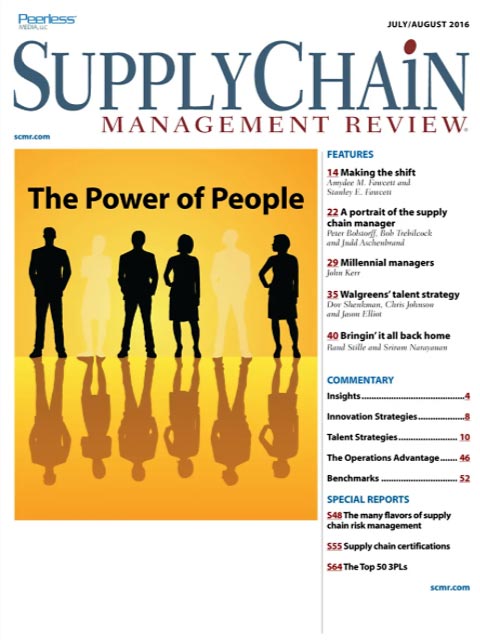Sorry, but your login has failed. Please recheck your login information and resubmit. If your subscription has expired, renew here.
July-August 2016
What’s the difference between us and our competitors? Our people!” I can’t think of an organization that doesn’t publicly state that its people are its most important asset. Yet, anyone who has been in the workforce for any length of time knows that when the rubber hits the road—or something else hits the fan—people are usually the first casualty of cost cutting. It’s far easier to free up your talent for “other opportunities” than it is to close a plant or sell a fleet of trucks. Browse this issue archive.Need Help? Contact customer service 847-559-7581 More options
Study after study has shown that for every new supply chain manager entering the workforce, two (or more) are retiring. Although supply chain programs are proliferating, today’s universities simply aren’t producing enough high-quality supply chain managers to fill the need. This story line, however, is incomplete. The talent crisis isn’t just about demographics. The crisis is more about mindsets and skills sets—and our inability to develop the talent to thrive in tomorrow’s global decision-making environment.
Amazingly, the “skill set” dimension of the talent crisis is not new. Over a decade ago, authors Edward W. Davis and Robert E. Spekman warned: “It is essential that we recognize that most managers do not currently possess the skills or mindset needed to operate in an extended enterprise environment.”
What skills were they referring to? Answer: Few managers— including supply chain managers—possessed the willingness to get “out of the box” and the ability to think and act collaboratively. They struggled to deal with ambiguity and change. They failed to appreciate the big picture—especially how their decisions impact value creation across the company and up and down the supply chain. Sadly, we’ve made little progress over the past decade in producing managers who possess these skills that are so critical to value co-creation.
 |
This complete article is available to subscribers
only. Click on Log In Now at the top of this article for full access. Or, Start your PLUS+ subscription for instant access. |
SC
MR
Sorry, but your login has failed. Please recheck your login information and resubmit. If your subscription has expired, renew here.
July-August 2016
What’s the difference between us and our competitors? Our people!” I can’t think of an organization that doesn’t publicly state that its people are its most important asset. Yet, anyone who has been in the… Browse this issue archive. Access your online digital edition. Download a PDF file of the July-August 2016 issue. |
Download Article PDF |
Study after study has shown that for every new supply chain manager entering the workforce, two (or more) are retiring. Although supply chain programs are proliferating, today's universities simply aren't producing enough high-quality supply chain managers to fill the need. This story line, however, is incomplete. The talent crisis isn't just about demographics. The crisis is more about mindsets and skills sets—and our inability to develop the talent to thrive in tomorrow's global decision-making environment.
Amazingly, the “skill set” dimension of the talent crisis is not new. Over a decade ago, authors Edward W. Davis and Robert E. Spekman warned: “It is essential that we recognize that most managers do not currently possess the skills or mindset needed to operate in an extended enterprise environment.”
What skills were they referring to? Answer: Few managers— including supply chain managers—possessed the willingness to get “out of the box” and the ability to think and act collaboratively. They struggled to deal with ambiguity and change. They failed to appreciate the big picture—especially how their decisions impact value creation across the company and up and down the supply chain. Sadly, we've made little progress over the past decade in producing managers who possess these skills that are so critical to value co-creation.
 |
SUBSCRIBERS: Click here to download PDF of the full article. |
SC
MR

Latest Supply Chain News
Latest Podcast

 Explore
Explore
Latest Supply Chain News
- 2024 Warehouse/DC Operations Survey: Technology adoption on the rise
- Benchmarking the complexity of ESG reporting
- Looking back at NextGen 2024
- The Corporate Sustainability Due Diligence Directive
- How to make your CFO a supply chain superfan
- AI is moving omnichannel closer to the customer
- More latest news
Latest Resources

Subscribe

Supply Chain Management Review delivers the best industry content.

Editors’ Picks





